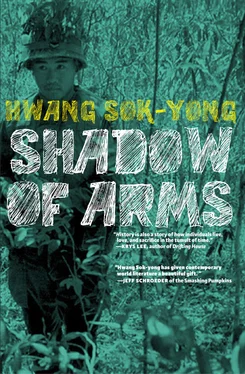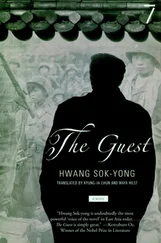The major kept his mouth shut and saluted. Pham Quyen responded in kind and then quickly snapped his hand back down. The major and the communications sergeant left. The third major assigned as magistrate, who had returned a while before and had been watching the scene in puzzlement, cautiously asked, “What’s this about?”
“Nothing special. This operation has no need for an officer who can’t command.”
Major Pham gave another instruction to one of the other communications officers. “Go out and bring me the master sergeant from the militia unit.”
The master sergeant, scared to death, came inside. Upon seeing his immediate commander, the magistrate, he snapped to attention and saluted.
“Master Sergeant,” Pham Quyen said, “you can relax. I didn’t bring you here to punish you. Take a seat over there.”
“I’m fine, sir.”
“Do you know this man?” Pham Quyen asked the magistrate.
“Yes, he’s a master sergeant in the local militia. For the present operation, he was assigned to take charge of the guard post at the An Diem junction. Has he committed some infraction?”
The magistrate frowned, but Major Pham shook his head. “No, nothing like that. You said your name is Tam, right? What’s your occupation?”
“I’m running a drinking place, sir,” replied the middle-aged man.
“Then you know quite a few of the men in An Diem and Ha Thanh very well, eh?”
“Yes, sir. On market days, lots of people turn up at my establishment, so I know some of the men.”
Major Pham asked the magistrate, “One militia company and one guard company here at this office. Is there no other local combat force?”
“We have another newly mustered militia company and a platoon of guards dispatched to An Diem,” said the magistrate.
“Master Sergeant Tam, do you know anything about cinnamon?”
Instantly a smile appeared on the master sergeant’s face. “Naturally, sir. This village at one time was very prosperous because of cinnamon, sir. The cinnamon merchants from Da Nang and Hoi An used to stay at my tavern for months on end. I used to round up work gangs for them and I distributed wages to them myself, sir.”
“I guessed as much,” Pham Quyen said. Then he turned to the magistrate and asked, “How is it going with the gathering of laborers?”
“Well, three hundred fifty men from Ha Thanh and one hundred fifty from An Diem, altogether five hundred are to be mobilized. As soon as the strongholds in the operations zone are secured and the reconnaissance missions into the target areas are finished early next week, we’ll be ready to start work.”
“Let Master Sergeant Tam be in charge of supervising the task assignments, and give him a platoon of militia forces.”
The next day, at the hour announced in advance, the villages along the river were bombed. In the region of An Hoa, the chief targets were the two villages located between Tabik and Quang Lung on the southern tributary of the Thu Bon River, and another hamlet at the mouth of the ravines running from Ha Thanh down to the Lien Hiep branch of the river. A special company in Bien Jiang set up a barrier along the Quel River, and a reconnaissance platoon was planning to sweep down from Lien Hiep bridge to Quang Lung.
The next step was to send two search-and-destroy units out of Ha Thanh to Tung Duk, and then to comb up from An Hoa to Bien Daio around Hill 3383 and into the Phuoc Binh Highlands to secure six safe posts in the region. Finally, the workers would be sent into the jungle to begin the harvesting. As the task of collecting cinnamon got underway, bulldozers would cut a road from Bien Daio and Lien Hiep all the way into the maze of ravines. The primary collection point would be set up there at the mouth of the ravines, with the goods trucked down the road to Ha Thanh and An Hoa.
Before Pham Quyen went to An Hoa, he headed for Lien Hiep bridge with the new battalion commander dispatched by General Van Toan. The strafing from helicopter gunships that had started at nine that morning was still going strong. The major newly assigned to the operations command seemed quick to grasp the situation and looked to be more pragmatic than his predecessor. Also, he turned out to be a graduate of the same training academy as Major Pham, which very likely was a result of thoughtful deliberation by the general. The new commander had been flown into An Hoa as dawn broke, and it was apparent he had been fully briefed on the progress of the operation. Although he was a major, too, he always made reports to Major Pham and addressed him with a deferential “sir.”
Accompanied by a force of company strength from the command post in Ha Thanh, they left and headed for the bridge at Lien Hiep. When they reached the An Diem junction, the company split off and prepared to cross the river by rafts. Their objective was to secure one of the enemy strongholds on the east side of the Tung Duk, where a reconnaissance platoon had encountered resistance. The militia at the junction looked alert. The reserve staff sergeant, to whom Major Pham had given the command, was supervising the sentries from the traffic control post. The junction was crowded: two units of the militia were guarding the road as the company combat unit was heading down in a line to the riverbank. The battalion commander and Major Pham sped past in their two Jeeps toward Lien Hiep. The sky was overcast with smoke from fires blazing in the jungle villages. Occasionally, firing of small arms and mortars was heard.
“Has the ground assault already begun?” asked Pham Quyen.
“No, that’s nothing. Probably just sniper exchanges,” the driver said, smiling.
The Lien Hiep bridge came into view. Like the smokestack bridge in Da Nang, it was an iron structure dating from early in the French colonial period. The half-moon shaped metalwork rose from concrete piers. Two tanks in camouflage nets stood at the end of the bridge, firing their cannons one after another with a dull, heavy report. Smoke was whirling up over the jungle about a mile and a half off, where gunships were circling overhead, buzzing high and low, shooting rockets and heavy machine guns. In front of the bridge, a communication post had been set up in a sandbag-reinforced trench, and on the far side of the river another set of trenches and bulwarks had been built. A squad of soldiers was spread out on their bellies in the middle of the bridge around a machine gun nest.
As the Jeeps rolled to a stop at the mouth of the bridge, a soldier ran up and saluted.
“Are you the company first sergeant?” the battalion commander asked.
“Yes, sir.”
“What’s the situation?”
“Let’s go into the bunker, sir.” The sergeant led the way.
They walked briskly toward the bunker. Down below they could see low-lying rice paddies. The slope of one of the levees was covered with civilians dressed in white. Men and women, old and young. Two guards were squatting on the bridge, keeping the civilians covered with their rifles.
“Who are those people?” Major Pham asked the sergeant.
“Residents of the village being bombed over there. They’ve been gradually showing up here since dawn. It’s been a real pain, sir.”
“You haven’t had breakfast yet, have you?”
“We only had time to conduct quick body searches. A company-strength combat force has already left for the village. Once the village has been cleaned out, we’ll begin the search-and-destroy sweep into the ravines.”
They went inside the bunker. Once they were seated on a field cot and ammunition crates, the sergeant commanding the company commenced his briefing.
“Right now, the company command post is here at this bridge. Two platoons crossed over the bridge yesterday and headed up into the Tungdik area. As I mentioned, another company is in process of seizing the nearby village still under air attack. One platoon is defending the bridge. Around midnight last night, we experienced an enemy attack. Fighting up in the Tungdik area turned out to be the fiercest, but the enemy was soon driven back, and we think they slipped through the ravines to the rear slope of Hill 3383. We took some mortar fire here from guerrillas across the river, and we had a firefight with others who had infiltrated from the southwest. Our casualties were two dead and five wounded. As for enemy losses, we can’t say since we haven’t secured their strongholds yet.”
Читать дальше












